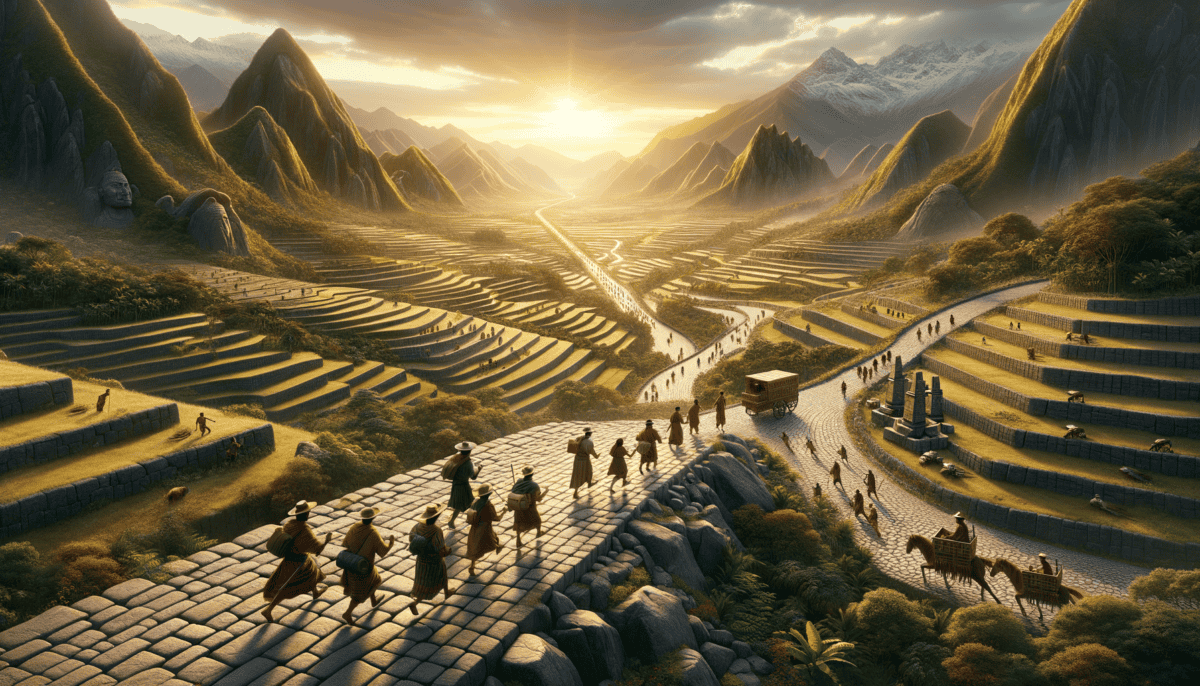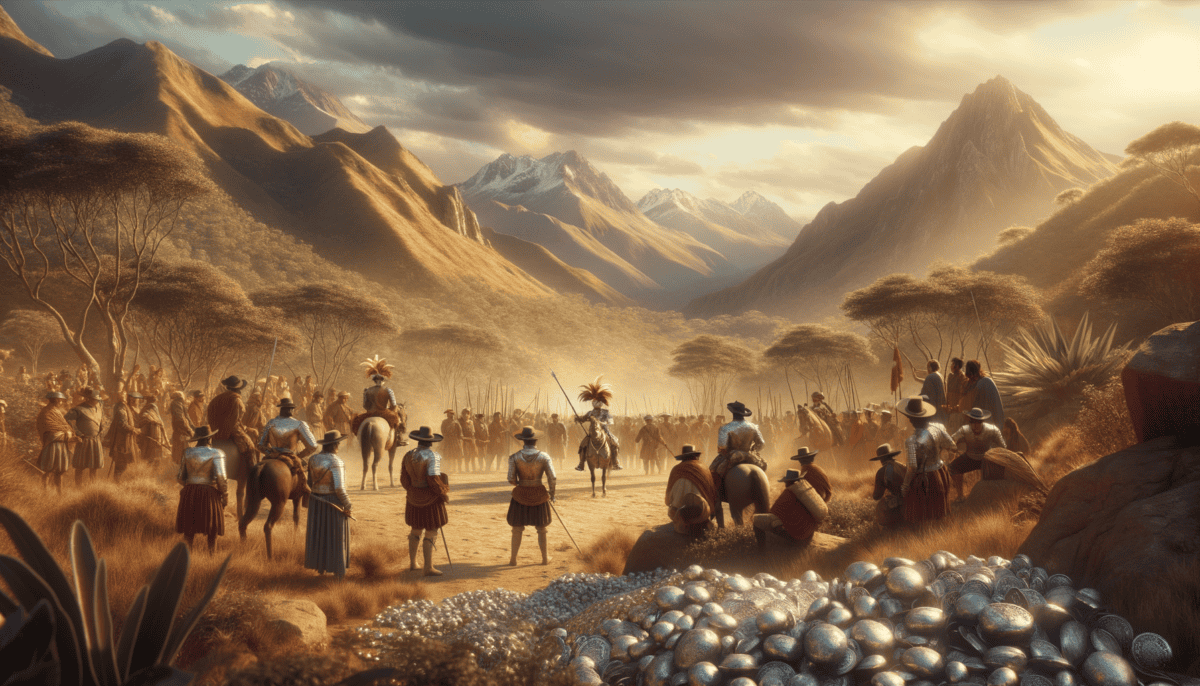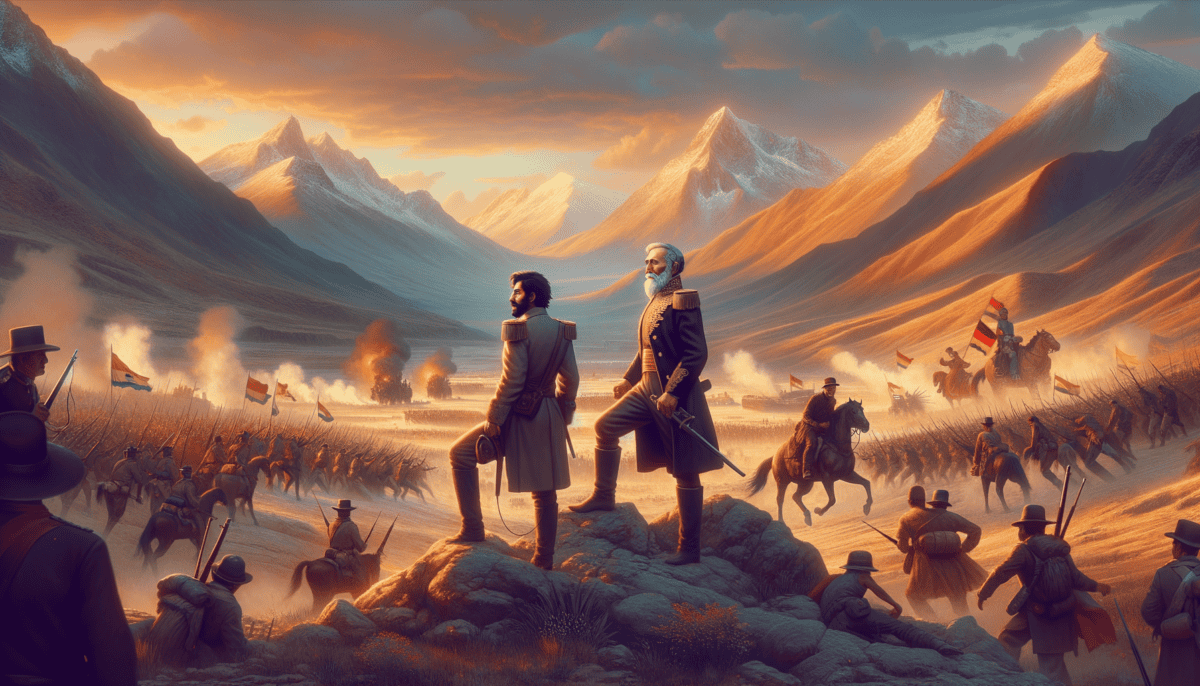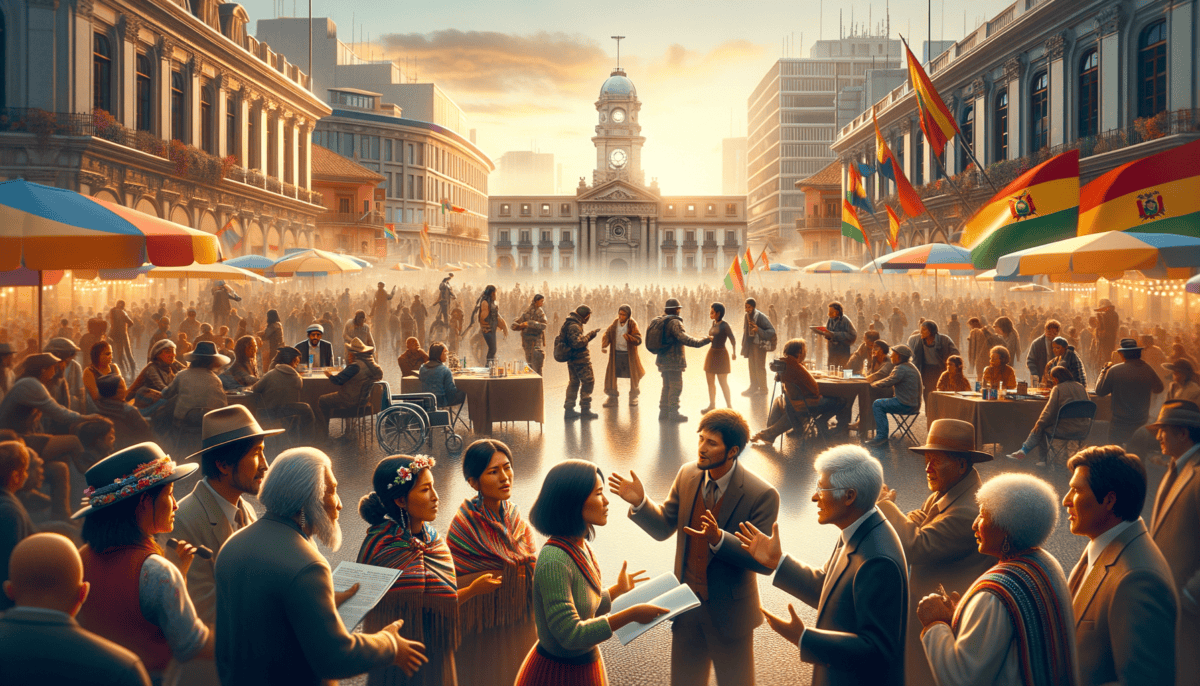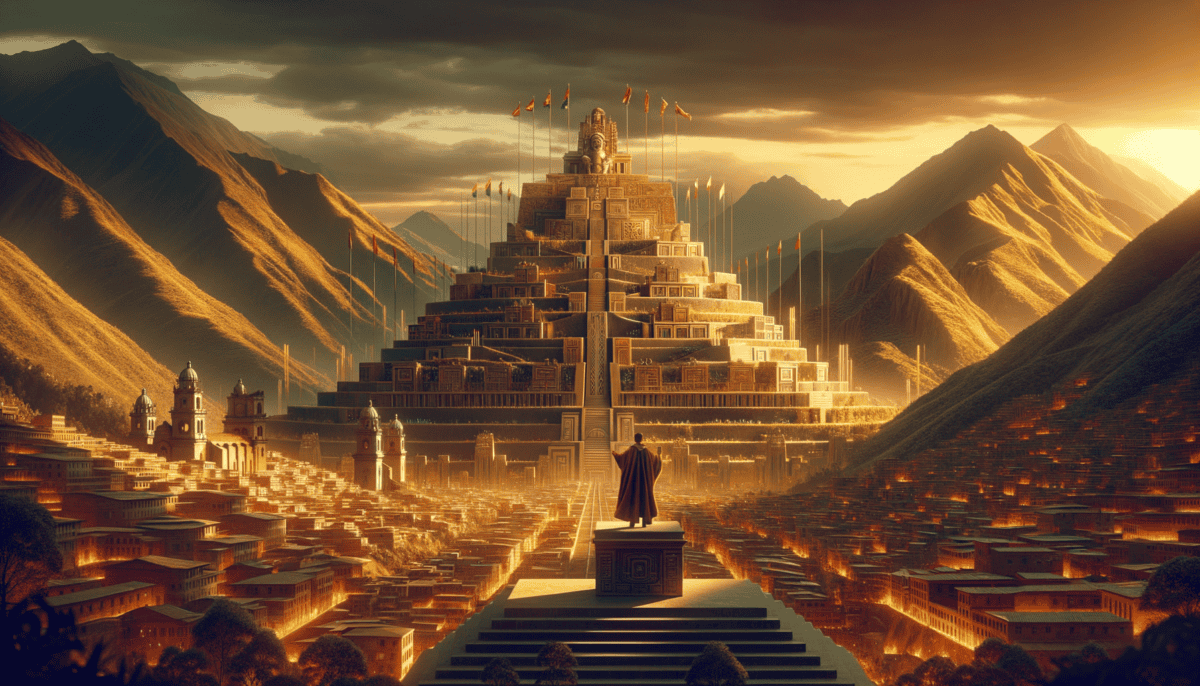Whispers of the Ancients
High in the Andes Mountains, where the air is thin and cool, an amazing story began long ago. The Tiwanaku people made their home here, building a mighty city that touched the sky. ️
"Look at these giant stones!" Maria exclaimed to her little brother Pablo as they walked through the ancient ruins. "Our ancestors were so clever to build such amazing things!"
The ruins of Tiwanaku still stand today near Lake Titicaca, the highest big lake in the world. The old stones tell us about people who lived here more than 1,500 years ago!
These ancient people were very smart farmers. They had special ways to grow food in the cold mountain air. They made raised fields called "sukakollos" that kept plants warm and safe from frost.
"But how did they move such big rocks?" Pablo wondered, touching the smooth stone walls.
Maria smiled. "They were excellent builders! They cut the rocks so perfectly that they fit together like puzzle pieces."
The Tiwanaku people loved beautiful things. They made:
- Colorful pottery with pictures of pumas and birds
- Shiny jewelry from gold and silver
- Warm clothes from llama wool
- Special tools for farming
“The Tiwanaku were masters of the mountains. They learned to live where others thought it was impossible.” – Ancient Stories of Bolivia
One of their most amazing buildings was the Akapana – a huge pyramid with seven levels! It was like a giant stairway to the sky. They also built the Gateway of the Sun, a massive stone doorway carved with mysterious figures.
The city grew bigger and bigger. People came from far away to trade and live there. But then something strange happened. Around 1,000 years ago, the great city began to empty.
"What happened to all the people?" Pablo asked, looking at the quiet stones.
"They moved to other places," Maria explained. "But they left us these amazing buildings to help us remember them. And some of their great-great-grandchildren still live in Bolivia today!"
The sun was setting over the ancient city, painting the old stones in golden light. The wind whispered through the ruins, carrying secrets from long ago. Even though the Tiwanaku disappeared, their story lives on in the mountains of Bolivia.
Pablo touched the ancient wall one last time. "I'm glad they built things so strong," he said. "Now we can learn about how special they were."
The mystery of Tiwanaku keeps teaching us new things. Scientists find more clues every year about how these clever people lived. Their story is just the beginning of Bolivia's amazing history.
The Inca Expansion
The bright morning sun shone over the Andes as a new chapter in Bolivia’s story began. The mighty Inca Empire was growing, and they had their eyes on the beautiful mountain lands.
“Tell me about the Inca people, Grandfather,” said little Rosa, sitting by the fire. Her grandfather smiled, his eyes twinkling with ancient memories.
“They were master builders who created a kingdom bigger than anything anyone had ever seen before!”
The Inca brought amazing changes to the land. They built roads that went up and down mountains like giant snake paths. These roads connected their whole empire!
They had special runners called “chasquis” who carried messages across these roads. Like this:
Runner 1: “Important message from the Inca king!”
Runner 2: “I’ll take it to the next station!”
The Inca were very organized. They had special ways to count things using colored strings called “quipus.” They also taught everyone to speak their language, Quechua.
• Special farming steps called terraces
• New foods like different kinds of potatoes
• Beautiful gold and silver art
• Smart ways to store food
“But Grandfather,” Rosa asked, “did everyone want to join the Inca Empire?”
Her grandfather shook his head. “Some people didn’t want to change their old ways. But the Inca were usually kind rulers. They let people keep many of their own customs while teaching them new things.”
The Inca built beautiful cities using huge stones that fit perfectly together. They even built a special city called Machu Picchu high up in the mountains! ️
They had smart ideas about sharing and working together. Everyone had a job to do:
- Farmers grew food for everyone
- Builders made roads and buildings
- Weavers made warm clothes
- Soldiers protected the empire
“The best part,” Grandfather said, “is that we still use many Inca ideas today. When you eat quinoa or potatoes, you’re eating foods the Inca grew. When you speak Quechua words, you’re speaking their language!”
The Inca made the land that would become Bolivia part of their huge empire. They built new cities, taught new skills, and connected people who lived far apart.
Rosa looked up at the stars, thinking about the ancient Inca. “We can still see the things they built,” she said. “They must have been very strong and smart.”
“Yes, little one,” her grandfather nodded. “And their story is part of who we are today. But new changes were coming – changes that would surprise even the mighty Inca empire.”
The fire crackled softly as the night grew deeper, and somewhere in the distance, an ancient Inca road wound its way through the mountains, still connecting the past to the present.
A World Turned Upside Down
The peaceful mountain morning shattered as strange sounds echoed through the valleys. People who had never been seen before were coming to the land. They wore shiny metal clothes and rode on big animals!
“What’s happening, Father?” young Taki asked, watching from behind a rock wall.
“These are the Spanish conquistadors,” his father whispered. “They have crossed the great waters to reach our lands.”
The year was 1532, and everything was about to change. The Spanish brought many new things:
- Horses and cattle
- Iron tools and weapons
- New languages
- Different ways of living
Two worlds met, and it wasn’t always friendly. The Spanish leader Francisco Pizarro wanted to take control of everything. Many brave Inca warriors tried to protect their homes.
“Why do they want our silver so much?” Taki asked.
“In their land,” his father explained, “silver and gold mean power. But they don’t understand that our real treasure is in our mountains, our farms, and our people working together.”
New foods came to Bolivia – like oranges and wheat
People started wearing different clothes
Churches were built in every town
Spanish became a new language to learn
The Spanish built new cities. In 1538, they made a city called La Plata (now called Sucre). They also started big mines where people had to work very hard.
Many indigenous people got sick from new diseases the Spanish brought. Others had to leave their homes in the mountains to work in the mines.
“But Father,” Taki said one evening, watching the sunset over their changed homeland, “we still remember our old ways, right?”
His father smiled and pulled out a colorful weaving. “Yes, my son. We keep our stories in our hearts and in our hands. See these patterns? They tell the story of our people.”
Life under Spanish rule was hard, but the people were strong. They found ways to keep their culture alive while learning new things. They spoke Spanish but also kept speaking Quechua and Aymara.
As the stars came out, Taki looked up at the familiar constellations his ancestors had watched for thousands of years. The mountains still stood tall, and the rivers still flowed. Even with all the changes, the spirit of the land remained strong.
“Remember, Taki,” his father said softly, “change can be like a strong wind that bends the grass. But like the grass, we learn to bend without breaking. And one day, we will stand tall again.”
The silver mines of Potosí kept growing, becoming the largest in all the Americas. But deep in the hearts of the people, a dream of freedom was beginning to grow too – a dream that would one day change everything again.
Dreams of Freedom
The sun rose over the Andes Mountains in 1809. The time for change had come. People were tired of being ruled by Spain.
“We deserve to be free!” declared Pedro Domingo Murillo, standing in the main square of La Paz. His words made people’s hearts beat faster with hope.
Little María watched from her window as crowds gathered in the streets. “Mama, what’s happening?” she asked.
“We are fighting for our liberty, mi amor,” her mother replied, braiding María’s long dark hair. “Just like the birds in the sky, we want to fly free.”
Two great leaders helped Bolivia become free: Simón Bolívar and Antonio José de Sucre. They were like superheroes who fought for people’s rights! ⚔️
The path to freedom wasn’t easy. Many brave people worked together to make it happen:
- Brave soldiers who fought in battles
- Women who carried secret messages
- Farmers who shared food with freedom fighters
- Children who acted as lookouts
“Will we win, Mama?” María asked one night, hearing shouts from the streets.
The fighting lasted many years. Sucre led his army through snowy mountain passes and across wide valleys. In 1825, something amazing happened!
“The Spanish are gone!” people shouted in the streets. “¡Viva Bolivia! We are free!”
The new country needed a name. They chose “Bolivia” to honor Simón Bolívar, their hero. Sucre became the first capital city, named after the brave general who helped win freedom.
The people could now:
– Make their own laws
– Choose their leaders
– Speak their languages freely
– Build schools for everyone
María danced with joy in the plaza. “Mama, what happens now?” she asked.
“Now, mi pequeña, we build our dreams,” her mother smiled. “We make Bolivia beautiful and strong.”
The new flag of Bolivia waved proudly in the wind – red for the brave heroes, yellow for the country’s riches, and green for the beautiful land.
At night, María looked at the stars through her window. The same stars had watched over her ancestors – the Tiwanaku people, the Inca empire, and now they would watch over a free Bolivia.
“Sweet dreams, free Bolivia,” she whispered, as the mountain breeze carried her words into the future.
Growing Pains
The morning sun peeked over La Paz, painting the sky in beautiful colors. Bolivia was free, but being a new country wasn’t easy.
“Change takes time,” Grandfather Carlos told young José as they walked through the market. “Like a baby learning to walk, our country must learn to stand on its own.”
José watched people hurrying past market stalls filled with colorful fruits and woven blankets. Some looked worried, others hopeful. “Why do some people look sad, Abuelo?” he asked.
“Tell me more about our land, Abuelo,” José said, sitting beside his grandfather near their favorite spot overlooking the city.
Grandfather Carlos pointed to the mountains and valleys stretching before them. “Our Bolivia is like a beautiful patchwork blanket, José. Each piece tells a story:”
- The snow-capped mountains guard our ancient secrets
- The valleys grow our food
- The forests hide precious treasures
- The salt flats shine like mirrors to the sky
But not everything was peaceful. Different groups of people had different ideas about how to run the country. Sometimes they argued, like siblings fighting over toys.
One day, José noticed workers in the tin mines looking tired. “Why do they work so hard?” he asked.
“Bolivia has many treasures underground,” his grandfather replied. “Silver, tin, and other minerals. But we must learn to share these riches fairly.”
The country was learning important lessons:
– Respect all people’s rights
– Share resources fairly
– Work together as one nation
– Remember our history
“Look, José!” Grandfather pointed to a group of children playing together – some in traditional clothes, others in modern dress. “That’s the Bolivia we dream of – where everyone belongs.”
As the sun set behind Mount Illimani, José watched the city lights twinkle on. “Will Bolivia be okay, Abuelo?”
Grandfather smiled, wrapping his warm poncho around them both. “Yes, mi nieto. Like a young tree growing stronger each day, Bolivia will find its way. Our roots are deep, and our spirit is strong.”
That night, José dreamed of a Bolivia where all people lived together happily, sharing stories and traditions under the same bright stars that had watched over their land for thousands of years.
Dreams Take Flight
The sun rises over modern Bolivia, where ancient traditions dance with new dreams. Young María stands with her mother at a colorful festival in La Paz, watching traditional dancers swirl past gleaming office buildings.
“Mamá, tell me how Bolivia changed in my lifetime,” María asks, her eyes sparkling with curiosity.
Her mother smiles, pointing to a poster of President Evo Morales, Bolivia’s first indigenous president. “That was a big moment, mi amor. In 2006, our people showed the world that anyone can lead, no matter where they come from.”
“Look at our beautiful city,” María’s mother says, gesturing to the cable cars gliding overhead. “These teleféricos connect our neighborhoods like silver threads in the sky.”
They walk through a modern market where phones and computers sit next to traditional medicines and hand-woven textiles. Young people tap on smartphones while elderly women in bowler hats sell colorful potatoes.
- New technologies help farmers grow better crops
- Schools teach in both Spanish and native languages
- Solar panels power homes in remote villages
- Electric buses help keep our air clean
María spots her friend Sophia playing with a robot at their school’s science fair. “We’re learning to code!” Sophia exclaims. “But we also learn our grandparents’ wisdom about the earth.”
“Bolivia is like a condor,” María’s teacher often says. “One wing carries our ancient wisdom, the other carries our dreams for tomorrow. We need both wings to fly.”
The country faces challenges too. Climate change affects the glaciers, and some people still struggle to find good jobs. But Bolivians work together to solve problems, just like their ancestors did.
– Proud of its diverse cultures
– Growing stronger every day
– Taking care of nature
– Building a better future
As evening falls, María and her mother join a community celebration. People of all ages dance together under strings of lights. Traditional flutes play alongside electric guitars.
“What do you want to be when you grow up?” her mother asks.
María thinks of the robotics class she loves, and the stories her grandmother tells about healing plants. “I want to be like Bolivia,” she says. “I want to keep the best of our past while building something new.”
High in the Andes, stars twinkle over a country that has found its wings. From the ancient ruins of Tiwanaku to the buzzing streets of La Paz, Bolivia’s story continues. Each generation adds new colors to this beautiful tapestry, weaving together past and future, tradition and innovation, creating a path that reaches toward the stars. ✨
As the festival lights glow against the night sky, María knows that her country’s greatest chapter is still being written – by millions of hands, all working together to make their dreams take flight.


